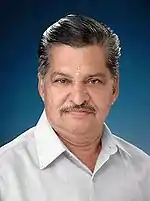V. S. Acharya
Vedavyasa Srinivasa Acharya (6 July 1940 – 14 February 2012)[1] was an Indian senior leader of the Bharatiya Janata Party (BJP) in Karnataka. He was the Higher Education Minister in the Government of Karnataka.[2]
V. S. Acharya | |
|---|---|
 Dr.V.S Acharya | |
| Born | Vedavyasa Srinivasa Acharya 6 July 1940 Udupi, Karnataka |
| Died | 14 February 2012 (aged 71) |
| Occupation | Higher Education Minister |
| Spouse(s) | Shanta |
Early life
V.S. Acharya was born on 6 July 1940 in Udupi in a traditional Brahmin family. His parents were Vidwan Katte Srinivasa Acharya, a Sanskrit scholar & Smt. Krishnaveni Amma. After finishing his graduation in Medicine from the famous Kasturba Medical College, Manipal, he started his medical profession by opening a private clinic in Kalmadi,Udupi and earned fame as a good physician in the town. He married a fellow social worker Dr.Shanta Acharya and the couple had 4 sons and 1 daughter.
Political career
Having been associated with the Rashtriya Swayamsevak Sangh (RSS) from his childhood, He started his political career in the erstwhile Bharatiya Jana Sangh (the predecessor of the BJP). He was first elected as a municipal councillor and then, as president of the Udupi municipal council in 1968.[3] This was the first ever victory of the Jana Sangh in an urban municipality in South India. The BJP leader Lal Krishna Advani later remarked that the Jana Sangh victory in the Udupi municipal council in 1968 laid foundation for the BJP rule in South India and particularly in the state of Karnataka. As the youngest municipal president of Udupi, he was hailed for his pro-active role in the development of the town. He remained municipal president for a period of 8 years and the Swarna river water supply system, Under ground drainage system, Town roads widening etc.were some of his achievements during this period. Under his presidency Udupi Municipality in 1968 became first in nation to ban carrying night soil by humans.[4]
During the Emergency (1975–77), he was imprisoned for a period of 19 months. After being released, he unsuccessfully contested the Lok Sabha elections from Udupi in 1977 and 1980. He was elected as a member of the Karnataka Legislative Assembly from Udupi constituency in 1983 and was the floor leader of the BJP Legislature party. He was as a Member of the Karnataka Legislative Council from 1996 until his death.
In the BJP-Janata Dal (Secular) coalition government headed by H.D.Kumaraswamy, he was Cabinet minister for Medical Education with additional charge of Animal Husbandry.[5] Following the historic victory of the BJP in Karnataka in the 2008 state assembly elections, he was appointed as the Home minister in the Yeddyurappa government.[6] He was considered as the second most important leader of the government after the Chief minister and was also the Leader of the House in the legislative council. As home minister, he was credited with the streamlining of administration and modernising of the police force in the state. Later, he was appointed as the Higher Education minister in 2010.[7]
Acharya was one of the most senior leaders of the BJP in Karnataka and as such, played an important role in the growth of the party in the state. He was president of the Dakshina Kannada district unit of the Jana Sangh (1974–77), Janata Party (1977–80) and BJP (1980–83). Also, he played a major role in the formation of the Udupi district in 1998. Known for his honesty, simplicity, dedication, wit and hard work, the soft-spoken Acharya was widely respected in the BJP and across party lines.[8][9] As a loyal worker of the RSS, he remained committed to the ideology and discipline of the organisation and inspired thousands of BJP workers and leaders.[10]
Death
He died of a heart attack on 14 February 2012.[11] He was participating in a program when he suddenly collapsed. He died on the way to the hospital.
The Chief minister D.V. Sadananda Gowda described him as the conscience keeper of the BJP Government. Various other leaders like L.K. Advani and B.S. Yeddyurappa paid homage to him and praised the services rendered by Acharya to the party and the state.[12]
References
- "Karnataka Education Minister VS Acharya dies". CNN-IBN. 14 February 2012. Retrieved 15 February 2012.
- "Smalland trvialincidents Acharya". Indian Express. Retrieved 7 September 2009.
- "V.S.Acharya". kar.nic.in. Retrieved 7 September 2009.
- "A visionary, Acharya had a rare streak of honesty". The times of India.
- "Acharya to meet Chief Minister on hospitals' power charges". The Hindu.
- "Guru-vandana to kanchi seer". The Hindu.
- "Cabinet Reshuffle: Acharya Loses Home, Palemar gets Muzrai". Daijiworld.
- "Acharya: Honesty and Integrity was his hallmark". The Times of India.
- "Dr V S Acharya – a Doyen of Education, a Doctor with Compassion". Mangalorean.com.
- "Sangh Parivar has a strong presence". The Hindu.
- "Karnataka Minister V.S. Acharya dies". The Hindu. 14 February 2012. Retrieved 14 February 2012.
- "Acharya was a man of integrity: Advani". The Hindu.